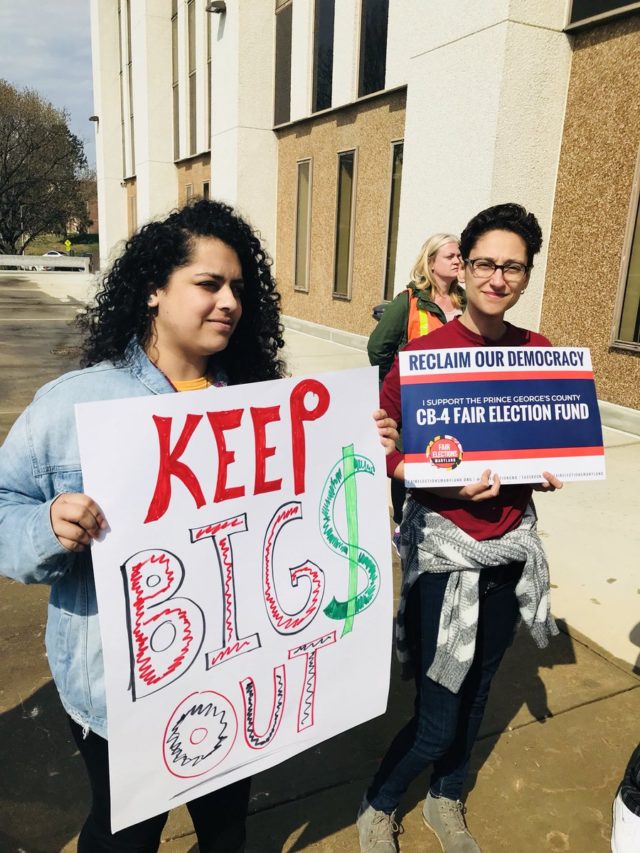Earlier this month, advocates around the country celebrated the US House’s passage of HR 1, a sweeping proposal to enact a series of pro-democracy reforms, including campaign public financing, increased disclosure of political donations, automatic voter registration, and stricter ethics rules. Although the bill is not expected to advance in the Senate, the momentary success of HR 1 is important, as it signals a shift in the national discourse about how we can respond to the overwhelming influence of money in politics. After years of unprecedented, rising attacks on our democracy, comprehensive policy reforms are finally on the table. To be sure, this is something we should all celebrate, even if HR 1 is not enacted into law this year.
However, in the democracy reform community, we often focus on policy reform as the sole measure of success. What is often lost is a truth that is easily missed: policy reform is not the end goal, it is merely a tactic.
What is often lost is a truth that is easily missed: policy reform is not the end goal, it is merely a tactic

Policy change should be seen as a means for underrepresented communities to increase participation and representation in government. It is a tool to build community power, to actualize true democracy. Too often, though, we funders—and as a result, our grantees—become so distracted by the light of policy wins that we forget to shift our gaze to the larger victories that these reforms make possible. Instead, the emphasis on policy reform can cause funders to flit from one issue campaign to the next. Funding priority is given to each succeeding policy effort, with little to no resources available for implementation of the last successful issue campaign.
Without funding for implementation, how do we build local capacity and buy-in to ensure policies are actually used as intended? How do we translate policy wins into long-lasting community power? If a policy is passed but its long-term impact is negligible, is it really a win? And is this the best use of our resources?
At the Piper Fund, we support community-led efforts to reduce the influence of money in municipal and state governments. To achieve this, we invest in public education efforts by local coalitions that are led by and actively engage underrepresented communities to promote reforms that will increase their access to democracy. If legislation is passed to create a public financing system, but communities are unable to use the newfound program to increase representation and have a stronger voice in government, the policy becomes nothing more than a futile exercise in political posturing. As funders, we need to expand our definition of a win beyond the policy victory. Winning must be long-term and it must be sustainable, and for that to happen, funding for implementation and defense are critical. Transactional, campaign-cycle grantmaking simply won’t cut it.
Winning must be long-term and it must be sustainable, and for that to happen, funding for implementation and defense are critical.
This feels particularly relevant given the current dynamics of the democracy reform field. On one hand, we have public financing victories like Seattle, where Democracy Vouchers have inspired organizers around the country who are fighting to amplify the voices of underrepresented communities. And yet, historically successful public financing systems in Arizona, Connecticut, and Maine are constantly being undermined by state legislators who seek to maintain power for themselves while avoiding accountability for their actions. Ongoing funding is critical to ensure that these policies are fully actualized and protected from future attacks.
New policy proposals often rely on the successes of other programs to make their case to residents and lawmakers, and any significant setback or victory is felt by the field as a whole. For example, the Fair Elections Maryland coalition is moving county by county, winning and implementing public financing programs throughout the state. The success of the coalition’s 2014 victory in Montgomery County set the stage for a 2016 win in Howard County, which in turn set up the passage of Question H in Baltimore City last year. The coalition is now organizing to expand public financing statewide, and its case is bolstered by the fact that prior wins are now being fully realized: in its first year of implementation, more than 30 candidates filed to run for just five seats in Montgomery County. This is a significant boon to ongoing and future public financing efforts throughout the state, as it shows the potential that public financing has in making our democracy more accessible and participatory.
On the flip side, there is no question that significant momentum would be lost statewide if Montgomery County’s public financing program had been deemed a failure, or if it were repealed prior to replication.
Winning policy reform is just the beginning if we want to see our victories stick.
Winning policy reform is just the beginning if we want to see our victories stick. It is critical that we build and maintain ongoing relationships with our grantees well before and after the policy victory, because without our commitment to implementation and defense, we cannot assume the coalitions we fund will have the resources to make that commitment either.
It is time to expand our definition of a win. The policy victory is just the beginning—what happens next is what really counts.